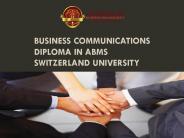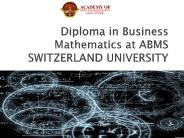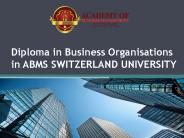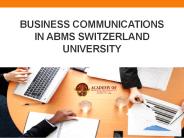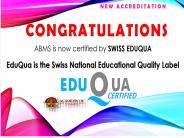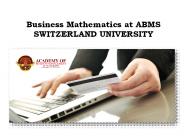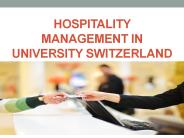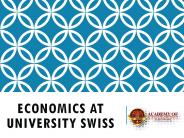Diploma In Ebusiness At Abms University PowerPoint PPT Presentations
All Time
Recommended
In this Program students examine how organisations can use all aspects of eBusiness to create new products and services, reduce the cost of existing business processes and improve the efficiency and effectiveness of their operations.
| PowerPoint PPT presentation | free to download
This course is designed to help students appreciate and understand the different types of business communication and their importance in an international context.
| PowerPoint PPT presentation | free to download
This course introduces and builds on a range of mathematical concepts and techniques. Students will be able to develop their analytical skills in order to make informed business decisions based on a wide range of data sources.
| PowerPoint PPT presentation | free to download
Our Business Study Programs will prepare you for today’s challenges to understand how to solve problems you may see in any business field
| PowerPoint PPT presentation | free to download
An understanding of the many roles and functions of management within a business is key for those aspiring to become managers of the future.
| PowerPoint PPT presentation | free to download
Our Business Study Programs will prepare you for today’s challenges to understand how to solve problems you may see in any business field,
| PowerPoint PPT presentation | free to download
This course introduces and builds on a range of mathematical concepts and techniques. Students will be able to develop their analytical skills in order to make informed business decisions based on a wide range of data sources. The course also develops a student’s ability to present data in a meaningful and systematic way.
| PowerPoint PPT presentation | free to download
This course is designed to help students appreciate and understand the different types of business communication and their importance in an international context.
| PowerPoint PPT presentation | free to download
This course covers the principles and functions of management. Students are taught the key elements in planning and decision-making and the significance of different controls required in an organisation.
| PowerPoint PPT presentation | free to download
This course introduces and builds on a range of mathematical concepts and techniques. Students will be able to develop their analytical skills in order to make informed business decisions based on a wide range of data sources.
| PowerPoint PPT presentation | free to download
This course is designed to help students appreciate and understand the different types of business communication and their importance in an international context.
| PowerPoint PPT presentation | free to download
The ability to understand the structure of an organisation and the factors that shape structures is an important skill in business. Managers need to have a good appreciation of the changes that they can make in order to improve organisational performance.
| PowerPoint PPT presentation | free to download
The course then explores the typical revenues models that can be adopted, the key role of eMarketing, the development of business-to-business strategies and the increasing importance of online auctions and virtual communities.
| PowerPoint PPT presentation | free to download
The study program in International Tourism and Hospitality Management is designed for students who are aspiring to hold careers in the management industry, and is comprised of four 3-month blocks
| PowerPoint PPT presentation | free to download
The ability to understand the structure of an organisation and the factors that shape structures is an important skill in business. Managers need to have a good appreciation of the changes that they can make in order to improve organisational performance.
| PowerPoint PPT presentation | free to download
The course starts with a basic but rigorous introduction to economic concepts and tools of analysis. It then moves on to discuss introductory microeconomic supply and demand analysis and different market structures.
| PowerPoint PPT presentation | free to download
This course is designed to introduce the basic concepts and techniques of financial accounting and management accounting. It is designed for students who have never studied business subjects before and who may not be native speakers of English.
| PowerPoint PPT presentation | free to download
this course can help students to gain skills as well as a respected qualification that will better their chances of entering the career of their dreams.
| PowerPoint PPT presentation | free to download
Management in ABMS SWITZERLAND UNIVERSITY | Management in ABMS SWITZERLAND UNIVERSITY
| PowerPoint PPT presentation | free to download
This is the first step of the Bachelor (BBA) Our Business Study Programs will prepare you for today’s challenges to understand how to solve problems you may see in any business field
| PowerPoint PPT presentation | free to download
Hospitality Management in ABMS UNIVERSITY | Hospitality Management in ABMS UNIVERSITY
| PowerPoint PPT presentation | free to download
This course is designed to help students appreciate and understand the different types of business communication and their importance in an international context.
| PowerPoint PPT presentation | free to download
This course is designed to help students appreciate and understand the different types of business communication and their importance in an international context.
| PowerPoint PPT presentation | free to download
This course introduces and builds on a range of mathematical concepts and techniques. Students will be able to develop their analytical skills in order to make informed business decisions based on a wide range of data sources. The course also develops a student’s ability to present data in a meaningful and systematic way.
| PowerPoint PPT presentation | free to download
The study program in International Tourism and Hospitality Management is designed for students who are aspiring to hold careers in the management industry, and is comprised of four 3-month blocks;
| PowerPoint PPT presentation | free to download
our graduates should countinue with the Bachelor study program (3 years in total) to improve their capacity understand and communicate effectively with their staff and work colleague, think Independently and work in a team to thrive in work situations. Read more
| PowerPoint PPT presentation | free to download
The course starts with a basic but rigorous introduction to economic concepts and tools of analysis. It then moves on to discuss introductory microeconomic supply and demand analysis and different market structures.
| PowerPoint PPT presentation | free to download
The course starts with a basic but rigorous introduction to economic concepts and tools of analysis. It then moves on to discuss introductory microeconomic supply and demand analysis and different market structures.
| PowerPoint PPT presentation | free to download
This course is designed to introduce the basic concepts and techniques of financial accounting and management accounting. It is designed for students who have never studied business subjects before and who may not be native speakers of English.
| PowerPoint PPT presentation | free to download
The study program in International Tourism and Hospitality Management is designed for students who are aspiring to hold careers in the management industry, and is comprised of four 3-month blocks
| PowerPoint PPT presentation | free to download
Swiss national educational quality at ABMS SWITZERLAND UNIVERSITY
| PowerPoint PPT presentation | free to download
Business Mathematics at ABMS SWITZERLAND UNIVERSITY | Business Mathematics at ABMS SWITZERLAND UNIVERSITY
| PowerPoint PPT presentation | free to download
This course introduces and builds on a range of mathematical concepts and techniques. Students will be able to develop their analytical skills in order to make informed business decisions based on a wide range of data sources. The course also develops a student’s ability to present data in a meaningful and systematic way.
| PowerPoint PPT presentation | free to download
This course covers the principles and functions of management. Students are taught the key elements in planning and decision-making and the significance of different controls required in an organisation.
| PowerPoint PPT presentation | free to download
This course introduces and builds on a range of mathematical concepts and techniques. Students will be able to develop their analytical skills in order to make informed business decisions based on a wide range of data sources. The course also develops a student’s ability to present data in a meaningful and systematic way.
| PowerPoint PPT presentation | free to download
The course will discuss the basic principles of communications within an international context from three key perspectives: written communication, visual communication and presentations, and non-verbal communication.
| PowerPoint PPT presentation | free to download
business university switzerland
- business university switzerland | universities switzerland english
business university switzerland | universities switzerland english
| PowerPoint PPT presentation | free to download
This course covers the principles and functions of management. Students are taught the key elements in planning and decision-making and the significance of different controls required in an organisation.
| PowerPoint PPT presentation | free to download
This course is designed to help students appreciate and understand the different types of business communication and their importance in an international context.
| PowerPoint PPT presentation | free to download
Our Business Study Programs will prepare you for today’s challenges to understand how to solve problems you may see in any business field
| PowerPoint PPT presentation | free to download
The study program in International Tourism and Hospitality Management is designed for students who are aspiring to hold careers in the management industry, and is comprised of four 3-month blocks;
| PowerPoint PPT presentation | free to download
The study program in International Tourism and Hospitality Management is designed for students who are aspiring to hold careers in the management industry, and is comprised of four 3-month blocks;
| PowerPoint PPT presentation | free to download
switzerland english universities
| PowerPoint PPT presentation | free to download
The study program in International Tourism and Hospitality Management is designed for students who are aspiring to hold careers in the management industry, and is comprised of four 3-month blocks
| PowerPoint PPT presentation | free to download
This course introduces and builds on a range of mathematical concepts and techniques. Students will be able to develop their analytical skills in order to make informed business decisions based on a wide range of data sources. The course also develops a student’s ability to present data in a meaningful and systematic way.
| PowerPoint PPT presentation | free to download
This course introduces and builds on a range of mathematical concepts and techniques. Students will be able to develop their analytical skills in order to make informed business decisions based on a wide range of data sources. The course also develops a student’s ability to present data in a meaningful and systematic way.
| PowerPoint PPT presentation | free to download
The course starts with a basic but rigorous introduction to economic concepts and tools of analysis. It then moves on to discuss introductory microeconomic supply and demand analysis and different market structures. The macroeconomic section of the course commences with the circular flow of income and the multiplier which are used as the bases of a discussion of the impact of government activity and foreign trade upon economic activity.
| PowerPoint PPT presentation | free to download
The course starts with a basic but rigorous introduction to economic concepts and tools of analysis. It then moves on to discuss introductory microeconomic supply and demand analysis and different market structures.
| PowerPoint PPT presentation | free to download
This course introduces and builds on a range of mathematical concepts and techniques. Students will be able to develop their analytical skills in order to make informed business decisions based on a wide range of data sources. The course also develops a student’s ability to present data in a meaningful and systematic way.
| PowerPoint PPT presentation | free to download
An understanding of the many roles and functions of management within a business is key for those aspiring to become managers of the future.
| PowerPoint PPT presentation | free to download
The course starts with a basic but rigorous introduction to economic concepts and tools of analysis. It then moves on to discuss introductory microeconomic supply and demand analysis and different market structures.
| PowerPoint PPT presentation | free to download
This course covers the principles and functions of management. Students are taught the key elements in planning and decision-making and the significance of different controls required in an organisation.
| PowerPoint PPT presentation | free to download
good universities in switzerland
| PowerPoint PPT presentation | free to download








